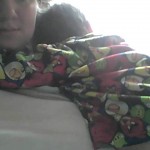There’s supposed to be a rush of euphoria. His heart should begin to beat faster.
Abram sighs and turns the infant’s metal skeleton over in his hands, waiting for something. Maybe after he adds the muscles and skin, he’ll feel it.
He reviews the video again, for what must be the hundredth time. There’s blood and fluid — so much that Abram would say the mother is at risk of death — but the woman’s eyes soften when the infant first cries. Its head is malformed. The skin is wrinkled and flaky. But the woman reaches out for it with shaking hands, pulls it to her breast and trembles as she sobs.
He checks his sensors. No rush, no euphoria, and certainly no tears.
Perhaps the infant also needs a heart. The human mother keeps the human child near hers.
Abram walks through the cryo-chambers again, checking the vitals of each sleeping crew member. The first one is too broad, too tall — his tissue would go to waste. The second is too old, her skin thin and her muscles weak. This child will need to sustain Abram for several decades until the crew wakes and begins their mission anew.
The third is perfect. Sixteen, barely more than a boy himself. He’s the child of the first mate — perfect. Surely the man will appreciate the reappropriation of the boy’s tissues, understand Abram’s need as a father. The read-out says the boy’s name is Stefan.
Abram pulls the stasis tube from the refrigeration unit, cradling it to his chest as he carries it to his work station. The glass of the tube grows condensation the gel within warms. With the speed and precision he was programmed for, Arbam slides the tube into the treatment bay.
Stefan thaws in just under six hours, his first noises something akin to the mewl of a kitten. His skin is slick from the gel, but bright and healthy.
Abram floods the bay with the gasses to treat the tissue for donation. He looks at his own skin as he does so, curious as to who donated these tissues. The programmers had not added the information to the hive. They never did. Stefan would not be erased.
The tissues are treated and separated from Stefan’s skeleton. First the skin, carefully cut, shaped and hung from clips along the wall. Until it could be connected to the living mechanism, the wall kept it damp. The muscles and organs rest in solution to keep them active.
Abram first deconstructs the heart — it’s too large to fit into his child’s chest. Then he rebuilds it, stretches and sews the muscles over the pumps that will cause it to beat. When stimulated with a live wire, the little heart flutters to life.
Abram’s lips twitch with a small smile, until he pulls the electricity away and watches it go dead.
He rests his hand on the smooth metal of the baby’s skeleton, the whole chest fitting under his outstretched fingers. He tilts it to one side and pulls the saw down from its hook.
The metal is strong but thin; it only takes minutes to slice through the soldered seams and lift the front of the chest away. The heart fits into the hollow of the infant’s chest, nested in the nervous wiring and connected to the limited network that would be his child’s brain.
It’s the work of three more hours to wire in the little heart and seal the chest again.
Abram pulls the infant to his chest, and feels the gentle thump reverb through his being. His own heart stops for a second, a curiosity before it starts again, moves in unison with that of the little metallic thing in his arms.
The euphoria hits as he stares at gaps where his child will have eyes, the frame made from the same metal of his own. He cradles the head carefully as he sets his child down and begins to wind together its muscles.
 I wanted to review something unexpected. I wanted to be like, “Look at this awesome, avant-garde thing you’ve never heard of before.”
I wanted to review something unexpected. I wanted to be like, “Look at this awesome, avant-garde thing you’ve never heard of before.”